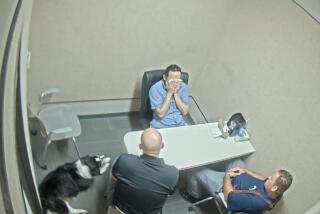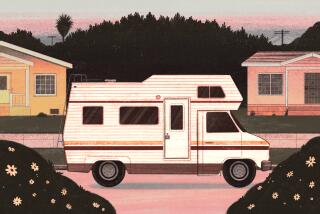Hope and Fear Accompany Family’s Search for Ailing Man : Missing person: David W. Piper Sr., who has Alzheimer’s disease, disappeared from his home in April. Not knowing his fate is the hardest thing for his loved ones to handle.
- Share via
It’s been almost seven weeks since 78-year-old David W. Piper Sr., his mind clouded by Alzheimer’s disease, walked out of his home on a quiet residential street in San Pedro and disappeared into the night. He had nothing with him but some pocket change, his medical ID necklace and the clothes on his back. He left behind a family that loves him, and his beloved dog Spanky.
He’s been missing ever since.
Every morning since then, 46 mornings in a row, his children and relatives have awakened with the same feelings of hope and fear and dread--hope that this is the day when he will be found, alive and well; fear that he is hurt or suffering, or even dead; dread that this day will be like all the others, that they’ll have to go through this day and then wake up again, not knowing, still wondering.
The Piper family--daughters Evangeline and Sharon, sons Danny and David, David Sr.’s sisters Dolly Axthelm and Georgia Cobb, stepdaughter Bonnie Hayes, ex-wife Hope and others--has done everything to find him. Along with neighbors and friends, family members have distributed thousands of flyers to hospitals, nursing homes and churches. They have relentlessly searched the hills and the parks and the streets of San Pedro and other communities.
They never drive anywhere without constantly looking around them, hoping he will appear. They have written to politicians, beseeching them for help. They have hounded TV station news directors and newspaper editors, pressing for the media coverage that may reach someone who has seen him. They have repeatedly called the police, the sheriff’s office and the county morgue.
“I wake up every morning thinking about him,” said David Piper Jr., 50. “Where is he, what is he doing? It’s the not knowing that’s tearing us apart.”
“I keep imagining that I’ll look up and see him walking to the door,” added Evangeline Piper, 36, who with her brother, Danny, shares the house from which her father wandered away.
But her father doesn’t appear. It is as if the earth had swallowed him up.
Has he disappeared into the grim world of the homeless, where a confused old man wandering around is not noteworthy enough to merit questioning? Has he lost his ID necklace and been taken in by a hospital or board and care home as a John Doe? Did somebody pick him up, with good intentions or ill, and take him out of the Los Angeles area? Is he still alive?
The Piper family wrestles with those questions, and worse, every day.
The case of David Piper Sr., a retired gardener for the city of Los Angeles, is both common and unusual in Los Angeles. It’s common in that, according to the Alzheimer’s Assn. of L.A. County, there are an estimated 150,000 people in Los Angeles who suffer from Alzheimer’s disease, which is a degenerative malady of the brain. Of those, about 25% are “wanderers”--that is, people who forget where and even who they are, who drift away from where they’re supposed to be.
“One of the symptoms of the disease is restlessness and wandering,” said Judy Wunsch, coordinator of volunteers for the Alzheimer’s Assn., a nonprofit group that provides support services for victims and their families. “When you combine that restlessness with memory loss (another symptom of the disease), it can cause terrible problems.”
David Piper Sr.’s case is unusual, however, in the length of time he has been gone. According to Wunsch, most Alzheimer’s wanderers are found after a few hours or days, picked up by police or taken in by social service agencies, or finding their way home on their own.
In fact, Piper has disappeared twice before, and in both cases was quickly found. Two years ago, he was missing for three nights and had to be hospitalized for exposure after the police found him; in February, he disappeared for a night and was found the next day.
But not this time. And the Piper family looks, and waits, and hopes.
There have been a few false alarms. Piper’s sister, Dolly, was certain she saw him sitting in a park one day, so certain that she walked up prepared to throw her arms around the man. But it wasn’t him.
Then there was the time that David Jr. and Evangeline were at the Los Angeles Police Department’s Harbor Division station in San Pedro and a call came in that a body had been found in Lomita, a body that apparently had been dead for about a month--roughly the same amount of time that their father had been missing. Perhaps only someone who has been in their position can understand the mixture of feelings they had when the body turned out not to be their father; they were relieved that he hadn’t been found to be dead, and yet there was also a strange feeling of--it must be said--disappointment and frustration that the uncertainty would continue.
“If we just knew where he was,” David Jr. said as he sat with other family members in the living room of his father’s house. “Even if. . .” His voice trailed off, and then he said, “Even if we found out he’s dead, it would be better than this. If we just knew.”
Death can be handled; uncertainty cannot.
“When someone is dead, it’s over,” said Dolly Axthelm. “We’d know it was over. We’ve had to handle deaths before. But now we don’t know if he’s alive or . . . no, he’s alive, I just feel it. I really believe that. But we don’t know if he’s hungry, or cold. Whenever it looks like it’s going to rain, I worry about him. Is he someplace dry and warm? It’s just so terrible. I dream sometimes. I dream that he’s there, and I reach out to grab him, and then he’s gone.”
There is anger among the family members too, the feelings of people who are beset with tragedy and yet see the world going on as if nothing had happened. Nowhere is that more apparent than when the Piper family members talk about the police and the media.
Television stations, they say, have been reluctant to air the missing man’s photograph.
“Intellectually, I can understand” the media’s position about what constitutes news, said Wunsch of the Alzheimer’s Assn. “But when I see a story (on TV) about an elephant who died or a moose who got lost, I want to scream . . . What about this poor man!”
The police, too, suffer criticism from a family that doesn’t want to hear about manpower problems and lack of resources or other constraints, a family that just wants its loved one back.
“We understand their frustration,” said Detective Doug Stark, head of the Missing Adults Section of the LAPD, which handles more than 4,000 missing adult reports every year. (Most missing adult cases, Stark said, involve domestic quarrels or other intentional disappearances and eventually solve themselves when the missing person calls or returns home.) “They (missing persons’ families) would like us to go out and search the streets. But we don’t have the resources to do that.”
So, Stark said, the police do what they can. They send a bulletin out to the various divisions, put the missing person’s name on a national crime computer, periodically check the morgue.
Meanwhile, for the Piper family, the days pass one by one.
“The Lord knows where he is,” David Piper Jr. said. “We hope He will bring him back home.”
David W. Piper Sr. is Caucasian, 5-feet-7-inches, brown hair that is graying at the temples, blue eyes, 135 pounds, and 78 years old but may appear younger. He was last seen at 10 p.m. on April 25 at his home on Santa Cruz Street in San Pedro wearing tan Levis, a short-sleeve plaid shirt, brown shoes and green socks. He may also have been wearing an Dodger baseball cap and was wearing a medical-alert necklace when he disappeared. He also has epilepsy and high blood pressure.
Anyone with information about him should contact the LAPD Harbor Division (310) 548-7603 or the Piper family at (310) 431-5129.
For information concerning Alzheimer’s disease and programs to help prevent victims from wandering, contact the Alzheimer’s Assn. of L.A. County at (213) 938-3370.
More to Read
Sign up for Essential California
The most important California stories and recommendations in your inbox every morning.
You may occasionally receive promotional content from the Los Angeles Times.













